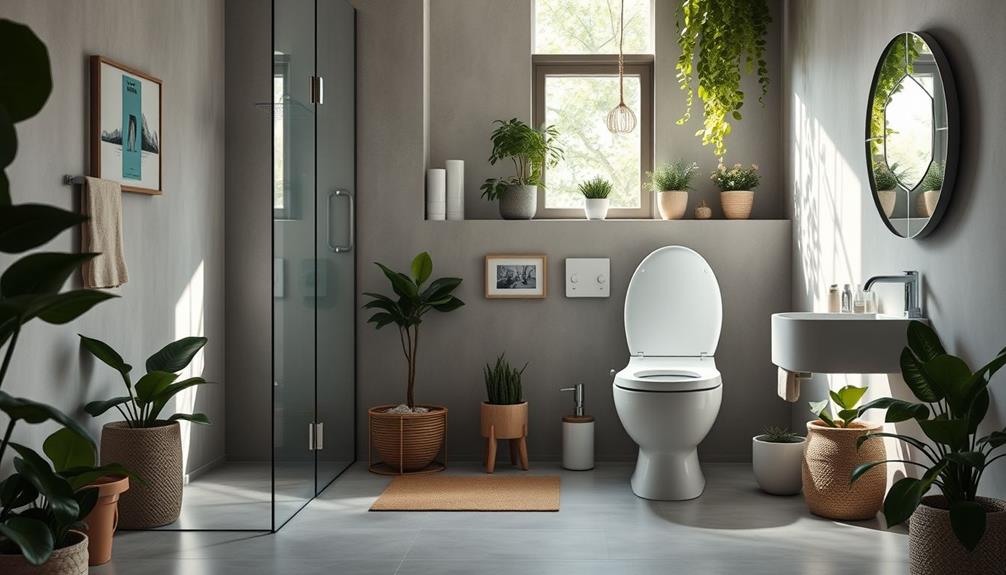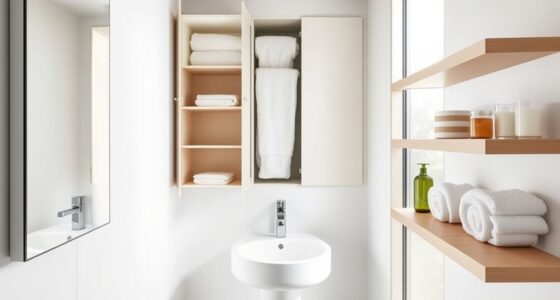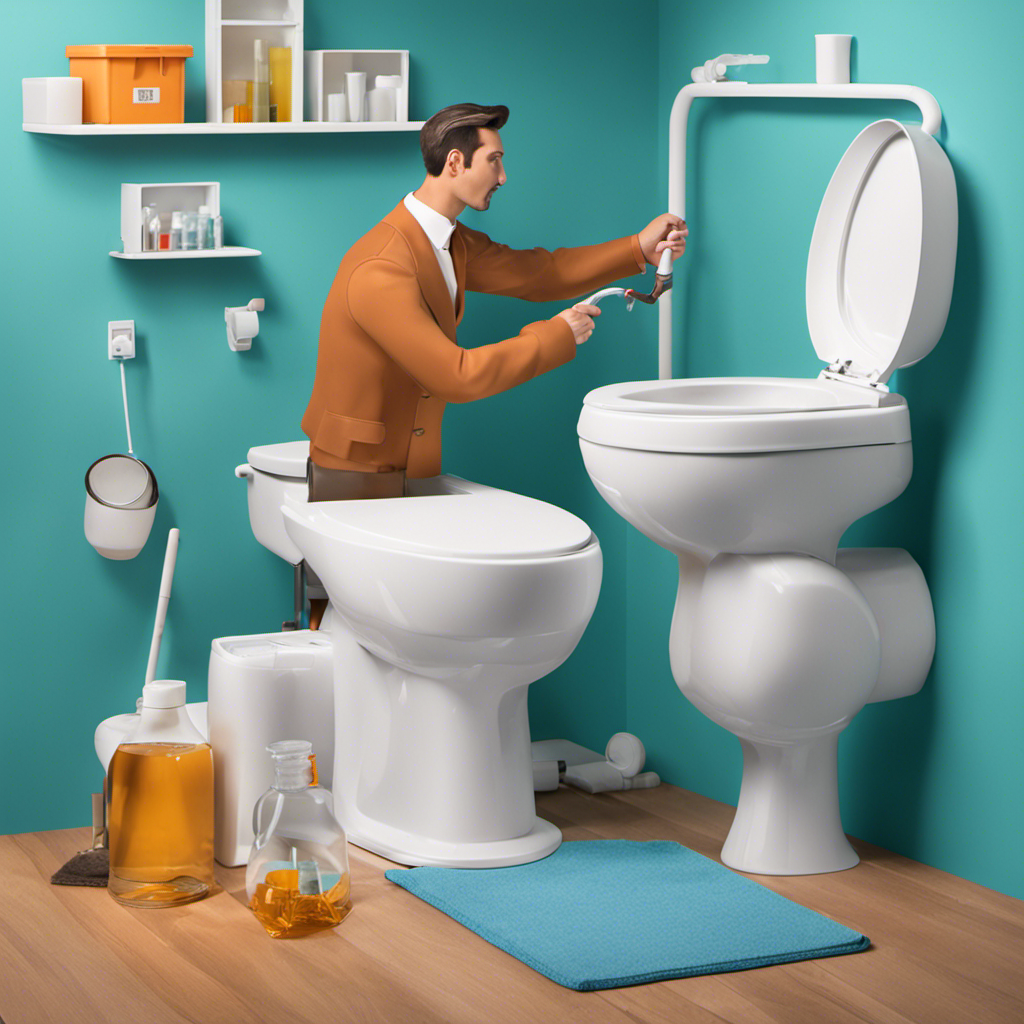Smart toilet apps let you monitor your health and habits conveniently. These innovative devices analyze your waste, gathering essential data on biomarkers and health indicators. With real-time insights transmitted to your smartphone, you can track hydration levels, dietary habits, and even detect potential health issues early. The technology promotes proactive health management and offers personalized recommendations. Though concerns about privacy and data security exist, user acceptance is growing. As smart toilets evolve, they'll likely transform how you approach personal health care. Keep exploring, and you'll discover how this technology can revolutionize your wellness journey.
Key Takeaways
- Smart toilets utilize advanced sensors to monitor health metrics through waste analysis, providing real-time health insights directly to users' smartphones.
- They can detect critical biomarkers, enabling early disease detection and proactive health management for conditions like diabetes and cancer.
- User acceptance is high, with 98% valuing health alerts; however, concerns about privacy and data security hinder broader adoption.
- Integration with existing health apps allows for a holistic approach to health management, combining data for personalized health interventions.
- The market for smart toilets is expected to exceed $7 billion by 2027, reflecting a growing interest in health-conscious technologies.
Overview of Smart Toilet Technology
Smart toilets represent a groundbreaking fusion of hygiene and health technology. These innovative devices employ advanced sensors to analyze waste, allowing for real-time health monitoring every time you use them.
While you might think of toilets as purely functional, smart toilets are revolutionizing consumer electronics by passively collecting biological data, offering insights into your health. By integrating features such as efficient water usage, these systems not only enhance sanitation but also promote sustainability.
With capabilities to measure crucial indicators like heart rate, body temperature, and hydration status, these toilets provide valuable information for early disease diagnosis and chronic disease management. The data collected is securely transmitted to the cloud, where it can be analyzed for trends and potential health risks, such as diabetes and hypertension.
This level of health monitoring is a game-changer, offering an unprecedented opportunity for proactive health management. Innovations like optical scanning for automatic metric quantification and integration with digital health platforms further enhance the utility of smart toilets.
As consumer interest in health monitoring features grows, the smart toilet market is projected to exceed $7 billion by 2027, showcasing the shift towards a more health-conscious society.
Take note—these toilets aren't just a trend; they're a significant step toward a healthier future.
Health Monitoring Capabilities
Smart toilets are changing how you monitor your health by analyzing your urine and stool for critical biomarkers.
This continuous data collection can alert you to potential health issues like dehydration or chronic diseases, allowing for proactive management.
Additionally, incorporating a holistic lifestyle approach can further enhance your overall well-being.
With these insights, you can take charge of your health in ways you never thought possible.
Disease Detection Potential
Revolutionizing health monitoring, innovative toilet technology dives deep into disease detection potential by analyzing your urine and stool samples. With the capability to monitor biomarkers like glucose and protein levels, these smart toilets offer early signs of diseases, including cancer and chronic conditions.
Additionally, this advancement aligns with the importance of mental health support, as mental health support is essential for cognitive health maintenance. By keeping tabs on your health data, you can receive timely alerts for any abnormal conditions, supporting effective chronic disease management.
The integration of smart toilets with digital health platforms guarantees that your biological data is securely transmitted to the cloud. This enhances disease risk prediction, allowing for personalized health recommendations based on real-time trends.
Imagine having a tool that not only tracks significant indicators but also provides insights into your overall well-being.
As the smart toilet market continues to grow—projected to exceed $7 billion by 2027—its potential for transforming home health monitoring becomes even clearer. By promoting preventive care, smart toilets can greatly reduce healthcare costs while making sure you stay informed about your health.
Embracing this technology means empowering yourself with the knowledge needed for early intervention and better health outcomes.
Continuous Data Collection
The latest advancements in toilet technology enable continuous data collection that transforms how you monitor your health. Imagine using a smart toilet that automatically tracks essential signs like your heart rate, body temperature, and hydration status every time you sit down. This passive health monitoring takes place during your routine bathroom visits, providing you with valuable insights without any extra effort.
Maintaining a balanced diet rich in whole foods for peak energy can further support your health goals, complementing the insights gained from your smart toilet data essential foods for combating colds.
The data collected goes beyond basic metrics; smart toilets analyze biomarkers in your urine and stool, offering early disease detection for conditions such as diabetes, kidney problems, and even certain cancers. By transmitting this information securely to cloud storage, users benefit from ongoing health tracking and personalized recommendations based on their unique health trends.
Moreover, the integration of smart toilet technology with digital health platforms enhances accessibility for diverse populations, making health monitoring easier and potentially reducing healthcare costs through preventive measures.
As research shows, the market for these innovative toilets is projected to exceed $7 billion by 2027, reflecting the growing interest in their health tracking capabilities. Embracing this technology means you're not just using a toilet; you're proactively managing your health with every visit.
User Experiences With Smart Toilets

Users' experiences with smart toilets reveal a blend of convenience and complexity. While many users find daily interactions easy, design flaws and mismatched technology can complicate the experience. The potential for health monitoring is significant, with smart toilets capable of detecting conditions like dehydration or diabetes through unobtrusive data collection.
| User Feedback | Key Insights |
|---|---|
| Easy to Use | High user acceptance (98% value health alerts) |
| Design Flaws | Need for user-centered design |
| Data Sharing Willingness | Mixed willingness to share personal health data |
Many participants emphasize the importance of ownership and control over their health data, highlighting that user-centered design is essential for smart toilet applications. The study identified various use cases, from health condition signaling to biomarker measurement, indicating diverse user needs. Overall, while users appreciate the convenience and potential of smart toilets, their experiences underscore the necessity for thoughtful design and effective data sharing protocols to enhance user satisfaction.
Barriers to Adoption

When you think about adopting smart toilet apps, cultural stigma around discussing personal waste might make you hesitate.
Additionally, concerns about AI's potential raises concerns regarding privacy and how your sensitive health data will be handled can create further reluctance.
Plus, integrating this technology into your daily routine might feel complex and overwhelming.
Cultural Stigma Challenges
Cultural stigma surrounding toileting events can greatly hinder the adoption of smart toilet technology. Many people feel embarrassed discussing bowel habits, which can lead to underreporting health issues and limit their willingness to participate in health monitoring. For instance, in the U.S., only 15-30% of individuals engage in home stool tests for colorectal cancer screening, largely due to the discomfort associated with fecal matter. This reluctance can prevent you from fully exploring the benefits that smart toilet applications offer.
Additionally, the emotional volatility associated with health discussions can mirror the challenges faced when maneuvering relationships with individuals who've BPD triggers, making it even more difficult to address these topics openly.
Moreover, smart toilets are often perceived as "high-tech" or "medical" devices, creating a psychological barrier that deters potential users. You might prefer traditional methods, feeling that these innovative solutions are invasive or unnecessary. This cultural stigma can make it challenging to have open conversations about health monitoring, which is essential for informed consent regarding smart toilet technology.
To overcome these barriers, it's crucial to foster an environment where discussing health issues related to toileting is normalized. By doing this, you'll likely feel more comfortable participating and providing the necessary information to take full advantage of smart toilet innovations.
Privacy Concerns Impacting Adoption
Amid rising interest in smart toilet technology, privacy concerns greatly hinder its adoption. You might worry about sensitive health data being accessed by unauthorized parties, especially as reports indicate that cybercriminals may target these applications for data theft.
The potential for health data alteration poses another significant barrier; incorrect information could reach healthcare providers, compromising your safety. Additionally, the importance of user experience optimization can't be overlooked, as a seamless experience could alleviate some of these privacy fears.
Security breaches at companies managing health data have raised alarms, making you hesitant to embrace smart toilet technologies. Moreover, the fear that your health data could be sold to advertisers adds to your reluctance, leading to targeted advertisements based on your personal information. It's unsettling to think about how that data could be used without your consent.
Moreover, the real-time access to health data from smart toilets raises additional privacy concerns. Continuous monitoring of such sensitive information can feel intrusive, making you uneasy about adopting these technologies.
Until these privacy issues are effectively addressed, it's understandable that many people, like you, might hold back from integrating smart toilet apps into their daily lives.
Technology Integration Issues
Integrating smart toilet technology into your daily routine can be a challenge, as many people struggle to see how these apps fit into their established health management practices.
Technology integration issues arise when users can't easily incorporate smart toilet apps into their lives. You mightn't immediately recognize the benefits of tracking your health through these devices, especially if you're used to traditional methods. Additionally, individuals may exhibit a tendency towards self-importance that hinders their willingness to contemplate new health technologies, as seen in behaviors associated with narcissistic traits.
Privacy concerns play a significant role in this hesitation. If you're worried about sensitive health data being collected and shared, it's understandable that you'd be reluctant to adopt these technologies. The ethical issues surrounding informed consent and data protection further exacerbate this mistrust. You want to feel in control of your data, and if that's uncertain, why would you engage?
Cultural stigma also hampers open conversations about toileting habits, creating barriers to adoption. Many individuals find discussing such topics uncomfortable, affecting their willingness to explore smart toilet apps for health monitoring.
To overcome these hurdles, developers must prioritize user privacy preferences and create seamless integration within daily routines, ensuring that smart toilet technology becomes a welcomed ally in health management.
Privacy and Data Security
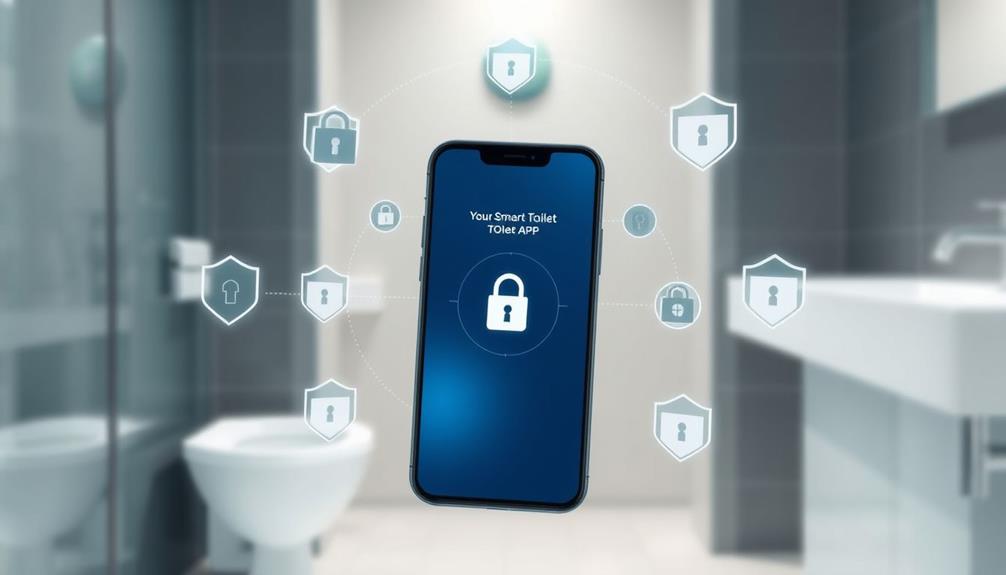
When it comes to smart toilet apps, concerns about privacy and data security are paramount. These apps collect sensitive health data, including biomarkers related to conditions like diabetes and urinary tract infections, raising significant privacy concerns.
As highlighted in recent discussions on user data vulnerabilities, you need to be aware of how your data is handled, as informed consent processes must clearly outline what information is collected, how it's used, and any potential incidental findings.
Regulations like the General Data Protection Regulation (GDPR) in the EU and the California Consumer Privacy Act (CCPA) enforce strict requirements on companies, ensuring transparency regarding data storage, sharing, and usage policies.
However, data breaches in the health sector are a growing risk. Cybercriminals may target smart toilet applications to steal personal and health information, making it vital for users to understand the risks involved.
While local anonymization and data deidentification practices are essential for protecting your privacy, advancements in technology increase the risk of reidentification of anonymized data.
As you consider using smart toilet apps, remain vigilant about how your data is protected and be proactive in ensuring that your privacy is prioritized.
Future Trends in Smart Toilets
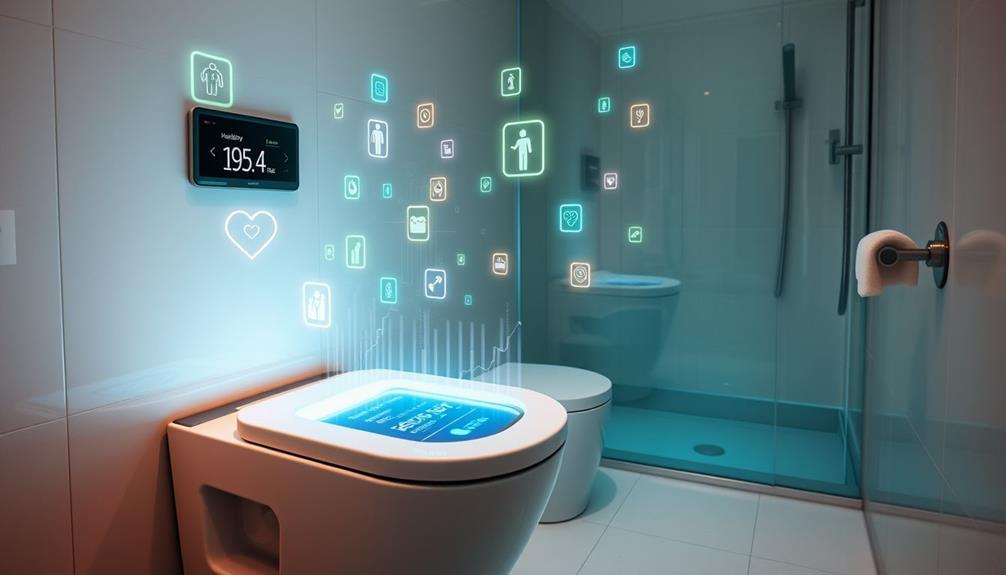
As smart toilets continue to evolve, you can expect a surge in advanced health monitoring features that integrate seamlessly into daily life. The market for smart toilets is projected to exceed $7 billion by 2027, driven by consumer demand for personalized health insights and innovations in health monitoring technologies.
Expect to see smart toilets equipped with AI that can analyze biomarkers in urine and stool in real-time, vastly improving disease detection and chronic disease management.
Companies like Casana and OutSense are leading the charge, securing significant funding to develop these life-enhancing technologies. As these innovations unfold, regulatory measures will likely evolve to address privacy concerns surrounding the health data collected by smart toilets, ensuring better data privacy for users.
Collaboration between technology developers and healthcare providers will be crucial to maximize the potential of smart toilets in improving public health surveillance and early disease detection.
With these advancements, you'll not only enjoy a more efficient bathroom experience but also gain valuable insights into your health, making smart toilets an integral part of your daily routine.
Practical Applications and Benefits

Smart toilet apps are revolutionizing how you manage your health at home. These innovative applications leverage sensor data to track crucial health indicators like heart rate, body temperature, and hydration status. By automatically logging toileting sessions, they help you monitor conditions such as urinary tract infections and constipation more effectively than traditional methods.
Here's a look at some practical applications and benefits:
| Feature | Benefits | Application |
|---|---|---|
| Health Monitoring | Real-time insights | Track crucial signs |
| Personalized Health Recommendations | Tailored advice | Improve health management |
| Disease Detection | Early identification of issues | Analyze urine and stool |
| Data Integration | Seamless communication with providers | Enhance care strategies |
| User Convenience | Simplifies tracking | Reduces manual reporting |
These smart toilet apps not only enhance day-to-day health monitoring but also promote proactive health management. They facilitate improved communication with healthcare providers, especially for aging populations, allowing for timely interventions based on your unique health profile. With the capability for early disease detection, these apps represent a significant advance in personal health management.
Frequently Asked Questions
How Smart Toilets Can Monitor Health?
Smart toilets monitor your health by analyzing waste for hydration, glucose, and protein levels. They track crucial signs during use, allowing you to receive valuable health insights and early disease detection through data analysis.
What Are the Disadvantages of Smart Toilets?
Imagine a sleek throne that whispers secrets, but it's not all magic. You'll face cultural stigma, privacy fears, high costs, and tech frustrations that can leave you questioning whether this royal seat's worth it.
What Does the Smart Toilet Do?
A smart toilet analyzes your waste to measure health indicators like temperature and hydration. It monitors your biological data passively, enabling early disease detection while providing personalized health recommendations based on trends it collects.
What Is the Smart Toilet Urine Test?
Imagine a world where your toilet's smarter than your ex. The smart toilet urine test analyzes your urine for health markers, tracking hydration, glucose, and protein levels, helping you catch potential health issues early.
Conclusion
As smart toilet technology continues to evolve, you might wonder how it could transform your daily routine and health monitoring. With their ability to track essential health metrics and promote better habits, these innovative devices offer significant benefits. However, it's important to navigate concerns about privacy and data security. Ultimately, embracing this technology could lead to a healthier lifestyle—are you ready to take the plunge into the future of personal hygiene and wellness?

